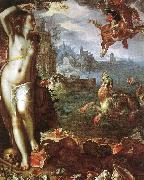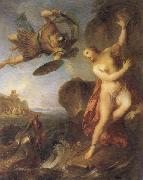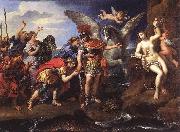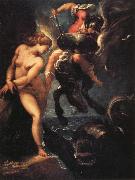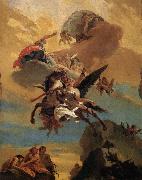
|
Joachim Wtewael
|
|||
|
|
|||
| 1566-1638 Flemish Joachim Wtewael Galleries Dutch painter and draughtsman. He was one of the last exponents of MANNERISM. From c. 1590 until 1628, the year of his latest known dated paintings, he employed such typical Mannerist formal devices as brilliant decorative colour, contrived spatial design and contorted poses. He sometimes combined such artifice with naturalism, and this amalgam represents the two approaches Dutch 16th- and 17th-century theorists discussed as uyt den geest (from the imagination) and naer t leven (after life). Wtewaels activity reflects the transition from Mannerism to a more naturalistic style in Dutch art. Slightly over 100 of his paintings and about 80 drawings are known. Subjects from the Bible and mythology predominate; he also painted several portraits, including a Self-portrait (1601; Utrecht, Cent. Mus.). | |||
|
|
|||
|
Perseus and Andromeda Joachim Wtewael2.jpg Painting ID:: 682 |
1611 Musee du Louvre, Paris | ||
|
|
|||
|
Francois Lemoine
|
|||
|
|
|||
| 1688-1737 | |||
|
|
|||
|
Perseus and Andromeda new2/Francois Lemoine-752535.jpg Painting ID:: 26629 |
mk53 183x149.7cm | ||
|
|
|||
|
MIGNARD, Pierre
|
|||
|
|
|||
| French Baroque Era Painter , b. 1612, Troyes, d. 1695, Paris called "Le Romain" to distinguish him from his brother Nicolas, was a French painter. He was born at Troyes, and came of a family of artists; he also needs to be distinguished from his nephew Pierre (1640-1725), often called "Pierre II" or "Le Chevalier". In 1630 he left the studio of Simon Vouet for Italy, where he spent twenty-two years, and made a reputation which brought him a summons to Paris. Successful with his portrait of the king, and in favour with the court, Mignard pitted himself against Le Brun, declined to enter the Academy of which he was the head, and made himself the centre of opposition to its authority. The history of this struggle is most important, because it was identical, as long as it lasted, with that between the old gilds of France and the new body which Colbert, for political reasons, was determined to support. Portrait of Louise de Kerouaille, Duchess of PortsmouthShut out, in spite of the deserved success of his decorations of the cupola of Val de Grace (1664), from any great share in those public works, the control of which was the attribute of the new Academy, Mignard was chiefly active in portraiture. Turenne, Moliere, Bossuet, Maintenon (Louvre), La Valliere, Sevigne, Montespan, Descartes (Castle Howard), all the beauties and celebrities of his day, sat to him. His readiness and skill, his happy instinct for grace of arrangement, | |||
|
|
|||
|
Perseus and Andromeda new3/MIGNARD, Pierre-439629.jpg Painting ID:: 29635 |
1679 Oil on canvas, 150 x 198 cm | ||
|
|
|||
|
MORAZZONE
|
|||
|
|
|||
| Italian Baroque Era Painter, 1573-1625 | |||
|
|
|||
|
Perseus and Andromeda new3/MORAZZONE-578964.jpg Painting ID:: 29973 |
mk67 Oil on cavnas 46 7/8x36 7/16in Uffizi,Gallery | ||
|
|
|||
|
Giovanni Battista Tiepolo
|
|||
|
|
|||
| Italian Rococo Era Painter, 1696-1770 Giovanni Battista Tiepolo was born in Venice on March 5, 1696. His father, who was part owner of a ship, died when Tiepolo was scarcely a year old, but the family was left in comfortable circumstances. As a youth, he was apprenticed to Gregorio Lazzarini, a mediocre but fashionable painter known for his elaborately theatrical, rather grandiose compositions. Tiepolo soon evolved a more spirited style of his own. By the time he was 20, he had exhibited his work independently, and won plaudits, at an exhibition held at the church of S. Rocco. The next year he became a member of the Fraglia, or painters guild. In 1719 he married Cecilia Guardi, whose brother Francesco was to become famous as a painter of the Venetian scene. They had nine children, among them Giovanni Domenico and Lorenzo Baldassare, who were also painters. In the 1720s Tiepolo carried out many large-scale commissions on the northern Italian mainland. Of these the most important is the cycle of Old Testament scenes done for the patriarch of Aquileia, Daniele Dolfin, in the new Archbishop Palace at Udine. Here Tiepolo abandoned the dark hues that had characterized his early style and turned instead to the bright, sparkling colors that were to make him famous. | |||
|
|
|||
|
Perseus and andromeda new4/Giovanni Battista Tiepolo-549849.jpg Painting ID:: 31786 |
mk76 Painted probably in 1730 Oil on paper,affixed to canvas 20 3/8x16in | ||
|
|
|||
|
Also Buy::. For Following Paintings / Artists / Products, Please Use Our Search Online: |






